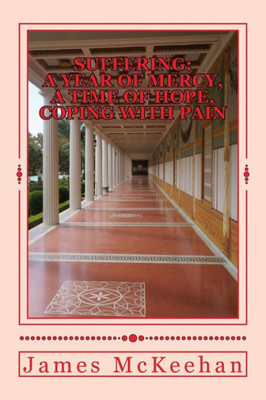

Suffering: A Year Of Mercy, A Time Of Hope, Coping With Pain
CreateSpace Independent Publishing Platform
ISBN13:
9781535151429
$16.64
This book was written to enlighten minds and it not only nourishes the spirit but it challenges our consciences. Suffering is presented as part of life to help the readers live through the pain and the suffering they may be experiencing. There are stories of individuals who were friends but belonged to different religious affiliations. Reading about this small group can help us visualize the many denominations that exist in the world. Our consciences are challenged by recognizing that we may have memes in our minds that influence incorrect thinking. Many memes are good and they nourish our consciences. We, also, need to recognize that perhaps many of our thoughts are not correct and the prejudices and wrong information we have, have been inserted into our brains through memes. Memes are units or bits of information that when allowed to grow in our minds, they can affect us in ways we do not know. We may be thinking as robots and not even know that we are not thinking on our own. Love always ends in pain and we cannot always predict when the love will end. Our love can end by separation that was caused by us leaving, the other person leaving, or when death comes about. The following stories are of people who suffered in their lives. Their lives may have ended unexpectedly, but their beliefs, thoughts and actions can be a learning experience for us and hopefully a positive influence to all of us. We must live with a love called mercy. Mercy is seeing our enemies with the eyes of Jesus so that we place helping others as the most important gift we have. Mercy also means confronting terrorism, gang violence, drugs, and bad military groups. We love those who are doing bad things, but we do not accept the wrong they are doing. The best way to examine our consciences is to reflect on our actions. When we make a decision, we have to reflect on the results of the decision. We must first have beliefs that ask the important questions like, "Where will my soul travel after my life on earth is finished?" "How can I visualize the journey of my soul?" Reflection on our beliefs is important and we must be open to the truths that challenge our beliefs. Our consciences are molded by truth so we must accept the truths we recognize. If our thoughts are correct, then the outcome of our actions must be consistent. Jesus prayed that we be of one thought so that when the world sees Christianity, it will know that the Father sent Jesus. This is written about in part 4 of the book. Part 4 challenges us to break down the wall we have made that prevents us from seeing truth; and with memes in our brains, truth is harder to find. We need to examine the foundation that our theology is built on. Part four was written to make us think. We are not robots; our minds need to be clear, and this can be done with much prayer. This book nourishes the spirit by discussing pain and suffering. It enlightens the mind by approaching the subject with real life examples. Most importantly it challenges us so that our consciences are filled with facts based on love and truths of history and outcomes. A church cannot be empty of substance. You cannot attend a church and ignore wrong doctrine, and the lack of substance in many of its teachings. Of course, great people may go to a church, but they need to proclaim all of their teachings and be able to do it with a clear conscience. Conscience is part of our primeval memory and the writings of Cardinal Ratzinger are explained. He reminded us that "Scripture, and the Church do not impose something new in us, but they activate the openness of the truth that is imbedded in our memory." We need to ask, "How do our beliefs align with the historical Church?" Secondly, "What are the outcomes of our beliefs that show we have correct doctrine?" Socrates said that an unexamined life is a life not lived.
- | Author: James Peter Mckeehan
- | Publisher: CreateSpace Independent Publishing Platform
- | Publication Date: Aug 22, 2016
- | Number of Pages: 250 pages
- | Language: English
- | Binding: Paperback
- | ISBN-10: 1535151420
- | ISBN-13: 9781535151429
- Author:
- James Peter Mckeehan
- Publisher:
- CreateSpace Independent Publishing Platform
- Publication Date:
- Aug 22, 2016
- Number of pages:
- 250 pages
- Language:
- English
- Binding:
- Paperback
- ISBN-10:
- 1535151420
- ISBN-13:
- 9781535151429





